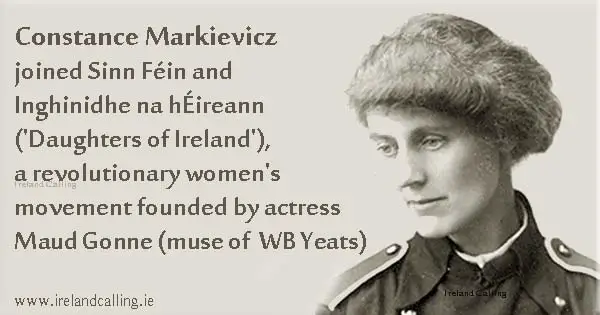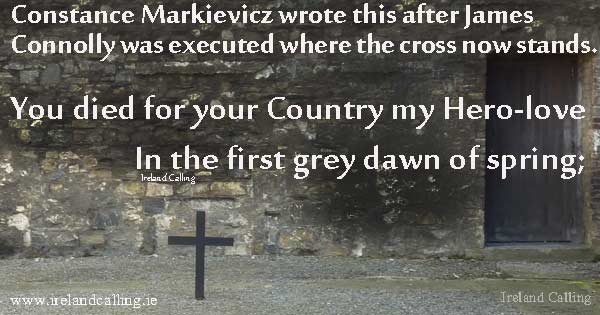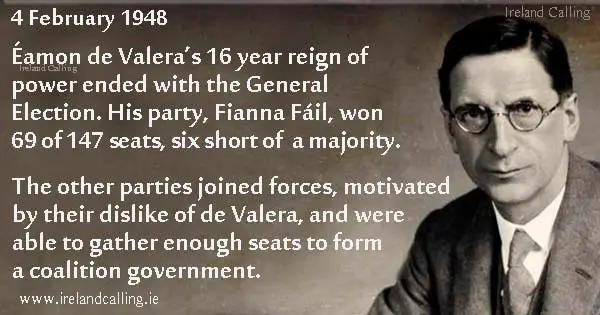1833 John O’Keeffe died on this day in 1833. He was a Dublin writer and actor and wrote many of the best comedy plays of his time. One of his plays, Wild Oats has been revived and performed as recently as 2012, by the Royal Shakespeare Company.
* * *
1868 Countess Markievicz, one of the most influential women in Ireland’s history, was born on this day in 1868. She played a key role in one of the most significant events in Irish history, the Easter Rising of 1916, but was spared execution because she was a woman.

Constance Markievicz worked closely with James Connolly, up to, and during the Easter Rising. She was jailed in Kilmainham Gaol with her comrades. She heard their executions, from her cell, which were carried out in the stone-breakers’ yard.
On the photo below, the cross marks the spot in Kilmainham where James Connolly was executed strapped to a chair (he couldn’t stand unaided as he was so badly wounded). She wrote this about Connolly after he was executed;
You died for your Country my Hero-love
In the first grey dawn of spring;
On your lips was a prayer to God above
That your death would have helped to bring
Freedom and Peace to the land you love,
Love above everything.

She was one of the first women in the world to hold a cabinet position in parliament – she was Minister for Labour of the Irish Republic from 1919 to 1922.
Click here for informative, easy-to-read articles about the Easter Rising
* * *
1948 The Irish General Election was held on this day in 1948. The result was the first coalition government in Ireland’s history, and the end of Éamon de Valera’s 16 year reign of power. De Valera’s party, Fianna Fáil won 69 of the 147 seats, six short of the number needed for a majority. He was unable to persuade the smaller parties to back him to form a government.

The other parties joined forces, motivated by their dislike of De Valera, and were able to gather enough seats to form a coalition government.
Richard Mulcahy, the leader of Fine Gael was the natural choice for Taoiseach, but he was aware that members of the Clann na Poblachta party would refuse to serve under him. Without their support, the coalition couldn’t be formed, so with this in mind Mulcahy stepped down as a potential leader. Instead, the coalition named John Costello as Taoiseach, and a cabinet was formed including the leaders of all the main parties within the coalition.
The cabinet was a mismatch of personalities on the face of it, containing republicans, free-staters, socialists, conservatives, young and old. However, they were united by their dislike of De Valera and Fianna Fáil, as well as being skilfully led by Costello. The coalition were moderately successful for three years, before De Valera and his party regained power at the next General Election.
* * *

1951 Happy birthday to Patrick Bergin, born in Dublin on this day in 1951. He is an actor and singer, most famous for his supporting role to Julia Robert’s as her abusive husband in the 1991 thriller, Sleeping with the Enemy.
* * *
1971 Happy birthday to Dara Ó Briain, born in County Wicklow on this day in 1971. He is a popular comedian and TV presenter, regularly appearing on British and Irish television.
He hosts comedy panel show, Mock the Week and The Apprentice aftershow, The Apprentice: You’re Fired on the BBC. Ó Briain is also a successful stand-up comedian, often compering for Live at the Apollo. He released several stand-up DVDs, including Dara Ó Briain Talks Funny and Craic Dealer.
Ó Briain got a degree in mathematics and theoretical physics from University College Dublin, and is a self-confessed science geek. He combined his two passions of comedy and science to make Stargazing Live, School of Hard Sums and Dara Ó Briain’s Science Club.
* * *
1971 On this day in 1974, a coach carrying British soldiers and their families was blown up by an IRA planted bomb as it travelled in Northern England. The explosion killed 12 people and the public demanded swift action from the police.
Judith Ward was convicted of the murders and sent to prison, only to be released 18 years later when it was proved that there was no evidence against her, and the police had manipulated and forged the case in order to get a quick arrest.